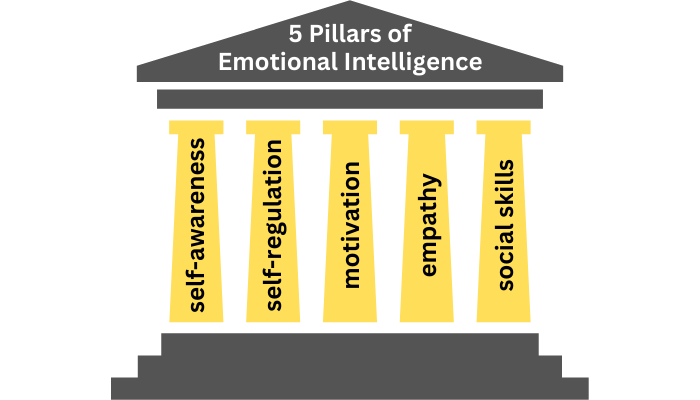Are you looking for emotional intelligence examples that can support your sales negotiation efforts?
Have you ever been in a situation where you find yourself getting frustrated or concerned during the negotiation? Or worse yet, the other individual you’re negotiating with or who’s negotiating with you is getting angry? They’re raising their voice, which of course can make you a little bit uncomfortable.
When it comes to negotiations in sales, there can be a lot of stress, a lot of strain, and particularly a lot of emotion.
That’s why using emotional intelligence in sales negotiations is a key method to make sure that you keep your calm and you see your way through to actually moving past those negotiations and being able to close the deal.
When it comes to negotiation in sales, customers can sometimes get upset, angry, frustrated, or raise their voice. You may feel concerned, frustrated yourself, or angry.
All of these emotions that may run between yourself and the individual or individuals you’re negotiating with oftentimes don’t help you when it comes to trying to bring the negotiation to a close and to keep the sale moving forward.
Your friend in that situation is emotional intelligence and is really tools that you need to be able to apply to be effective in sales negotiation. So let’s talk about exactly how you can do that.
What Are the 5 Pillars of Emotional Intelligence
(1:46)
What is emotional intelligence?
I’ll just give you the brief overview of what it is. Then I’ll give you some ideas of resources you can tap into that will be helpful to learn more about it.
First off, depending on who you talk to, there are different perspectives on what emotional intelligence consists of. I’ve heard some people say there’s four pillars, and some people say there are five. I’m going to give you five.

Pillar 1: Self-Awareness
First off, and probably most importantly, emotional intelligence is what it sounds like. It’s being self-aware of your own emotions.
So that’s step number one or point number one or pillar number one.
Pillar 2: Self-Regulation
Second is self-regulation. If you’re aware of your emotions, then being able to regulate those emotions in different situations is to your advantage.
Pillar 3: Motivation
The third is motivation. Being able to motivate yourself in situations when maybe motivation isn’t so easy.
For example, maybe you think the other individual you’re negotiating with that they’re going to walk, that this is over. But you’ve got to keep yourself in the game. You’ve got to stay motivated, stay positive, and stay focused on the goal.
Pillar 4: Empathy
The fourth is empathy, which you’ve probably heard before. I’ve actually done some videos on empathy in sales.
But really empathy is not really being sympathetic. It’s not saying, Hey, I feel your emotions, but it’s really saying, I understand your emotions.
So if this person’s upset right now because your quote is higher than their budget and they’re not happy, empathetic is, “Look, I can understand if that happened to me, I’d probably be upset too.” That’s empathy. Okay, so that’s the fourth pillar.
Pillar 5: Social Skills
And the fifth, fifth one for you to consider is really social skills.
It’s your ability in different situations to apply different social skills so that you can be effective. Now, I’m not going to dive into each of those so much today.
Examples Where Emotional Intelligence Supports Better Sales Negotiations

(3:35)
I’m going to focus on the earlier components. I think you’re going to find they’re most helpful when you’re in a situation that’s not so comfortable in negotiations.
Step one, consider that
Emotional intelligence is a key tool for you to use in sales negotiations. If you are feeling yourself getting upset, getting frustrated, you need to be able to be aware of that happening.
If you’ve ever dealt with somebody whose emotions went off the Richter scale, so to speak, they “lost it”? They get upset, they get angry, they “lose it”? What happens? That individual is often not successful in what they’re trying to achieve. All they do is upset the people around them.
Now, you really can’t control the emotions of the person you’re negotiating with, but if you can be aware of your own emotions, it’s going to ensure that you avoid going off the Richter scale, so to speak, right?
Because if you do that, the negotiations, maybe even the long-term relationship with the customer, it might be over.
So, the first step I want you to consider is in using emotional intelligence for sales negotiations, you want to be self-aware and be able to self-regulate your emotions. Let me give you a quick strategy to do that.
Negotiation Example #1: Your customer is agitated in some way

(4:44)
If you find you’re getting upset, you’re getting frustrated, you feel maybe something, it’s raising up in your body and you feel you’re getting tense, you’re getting upset, what you can often do is take a moment. So the person says something to you, and rather than just jump to a response, say to them, “That’s a really good point. Give me a minute to consider what you’ve said.”
That gives you a minute to calm down, okay? Gives you a minute to take a breath. Self-talk is also a great thing to do.
So when you’re in the conversation, you don’t want to miss out on key points and be over here thinking about things. However, what you can do is make sure you make note of key things.
Take that minute and use self-talk during the minute. Tell yourself, “Okay, this isn’t done. We’re still here. We’re still having a conversation. It’s maybe not where I want it to be. What’s a good question for me to ask to keep this moving forward?”
So being self-aware, regulating your emotions, using some self-talk is kind of the key attributes of using or at least initially using emotional intelligence in sales negotiations.
Now, as a couple more emotional intelligence examples, let’s jump into the next couple steps I want you to take.
Negotiation Example #2: You want to accelerate the close

(5:46)
So let’s flip this scenario around. Let’s say the other person’s not upset. The negotiation’s going generally pretty well, but we want to speed things along, or we want to ensure that we’re able to close the deal.
Well, you can also use emotional intelligence more strategically in your negotiations to really accelerate the close. How? When it comes to the initial conversations, you want to tune into the other person’s emotions.
Use your ability to really understand your own emotions to look at others, see them through a different lens, and ask yourself, what emotional state are they in right now?
If you see that they’re getting excited, for example, while they’re reading a brochure or during the meeting where you’re telling them how your product or service can help them, you want to capitalize on that. And if you’re tuning into their emotions, which is really using your EI skills, you have the opportunity then to respond to them. Say,
- “You know what? It looks to me like this is something you might be interested in.”
- “Would you like to discuss how we can set up a free trial?”
- “Would you like to discuss how we can bring you into one of our client’s facilities to see this in action?”
- “Would you like to set up a free consult?”
It really depends on what your offer is, based on what you’re selling, but my point is, when you use the EI tools for yourself and you become accustomed to them, it becomes very easy then to apply those same tools to other people and to help recognize their emotional state, and then use your emotional intelligence to counter that state, to take advantage of those opportunities to further the sale and further your influence.
Negotiation Example #3: You have a difficult customer

(7:15)
Now, I’ve already touched on this briefly, but what happens if you’re dealing with a prospect that’s just rude and arrogant and pushy right from the get-go?
Well, again, emotional intelligence is a key.
I have dealt with people who are not happy from the get-go, right at the very beginning of the conversation. My interpretation (that’s a key word) to their tone, their verbiage of language they’re using, maybe how they’re putting together an email, how they’re speaking to me on the phone. I interpret that to be, oh, this person is rude or pushy or upset.
But see, that’s the problem. I’m interpreting it. So what I need to do when that happens is I ask myself,
- “Well, is that just my interpretation of who they really are?
- “Maybe they sound this way all the time.”
- “Maybe they speak to everybody they know it doesn’t mean it’s right, but if that’s who they are and they’re still actually interested in my product or service, who am I to interpret anything?”
I just need to answer questions and move forward with my typical sales process.
(8:09)
So, when you become really adept at using your EI tools, being
- self-aware,
- being able to self-regulate,
- being empathetic, and
- using your own internal motivation to keep you moving forward, it becomes much easier.
It’s not perfect, but it’s going to become much easier to deal with those people that are pushy or rude.
I want you to always ask yourself, when you start to interpret somebody in that way, “Is this how they’re being right now with you? Or is this maybe how they are with everybody?” Maybe you’re reading too much into this.
Step two, if you’re finding they’re being pushy and rude, really tune into what emotional state they’re in and how that makes you respond. Sometimes somebody who’s being pushy and rude can make you upset so that you’re pushy and rude, and that’s like oil and water. It’s not going to go well.
But if you are aware of your emotions, based on them, you can sometimes change them.
(9:00)
You can say, “Okay, look, you know what? They’re upset. I’m not going to let it bother me. I’m going to actually take a moment here to sit back and relax, even though it might not be what they want, because I’m going to counter their emotion with a different approach to see the response I get.”
You see, sometimes with pushy, rude people, it’s just about snapping them out of that pushy or rude state by changing your emotional state. So that’s how you can deal with those people. Give that a try.
Negotiation Example #4: Get Beyond the Emotions and Get On with Your Sales Process

I’ve got one more thing for you.
What I want you to avoid doing is trying to become a master in EI, because people pick up on that, right? If I’m over-exaggerating my emotions or I’m constantly asking you, “How does that make you feel?” ” Oh, I can see that you’re upset right now.” Those kind of responses tend to be disingenuous.
People pick up on what you’re doing, as you’ve probably heard this before, they’re picking up on what you’re putting down. So you want to be very careful.
EI is something that you can use for yourself and you can use it without others knowing. But if you become too verbose about it, you start talking, but you start explaining, “I feel really empathetic”. Meanwhile, it seems like it’s coming off and it’s not that genuine. People will pick up on that and it’s not going to help your situation.
(10:10)
So the goal with EI is to understand what EI is, and then just practice those pillars.
- Practice being self-aware,
- practice regulating your emotions,
- practice empathy,
- practice emotion
- practice using different social skills in different environments
to see how you can navigate.
So I’m going to go into a networking environment with accountants and have very serious conversations. Then I’m going to go over here and maybe attend an event and network with circus clowns, right? Two very different groups, but you get the idea, right? I’ve got to be able to adjust my social skills in different environments if I’m going to be effective in sales.
Emotional Intelligence Resource for You: Daniel Goleman
(10:47)
Now, the resource for you. I am by no means the inventor of emotional intelligence. It’s been around a long time.
However, if you want to learn more about EI, I’d highly recommend reading or listening to books by Daniel Goleman. Many consider him an expert in this area. He’s written lots of books on it. There is some great content out there around EI, and I think you’re going to find it helpful.
I hope you enjoyed these emotional intelligence examples and tips to help close more sales deals . Make sure you check out my next videos coming up here. We’ll talk to you soon.
© Shawn Casemore 2025. All Rights Reserved.


Share This Article
Choose Your Platform: Facebook Twitter Google Plus Linkedin